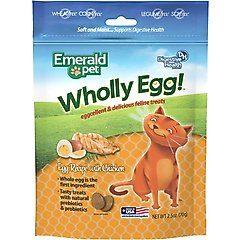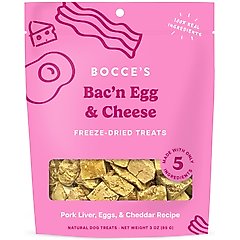Can Cats Eat Eggs?

Photo by Chewy
As you whip up an omelet for breakfast and hear your cat meowing in the kitchen, you may wonder, “Can cats eat eggs?” The short answer—yes! But there are a few things to be mindful of before sharing your plate of eggs with your kitty.
Here’s everything you need to know about the benefits and risks of feeding eggs to your cat and how to safely offer them as a healthy treat.
Before introducing any new food into your cat’s diet, always check with your veterinarian.
Key Takeaways
- Yes, cats can eat eggs—including both the yolk and white—as long as they’re fully cooked and served plain, without oil, salt, or seasoning.
- Eggs are rich in protein, fatty acids, and vitamins, making them a nutritious, occasional treat that supports muscle, heart, and immune health.
- Never feed raw eggs, which can carry Salmonella or E. coli and increase the risk of biotin deficiency.
- Feed in moderation; a teaspoon or two of cooked egg is plenty for most cats. Eggs should make up no more than 10% of their total daily calories.
Can Cats Have Eggs?
Yes, cats can have eggs, including the yolk and white. The eggs should be fully cooked (scrambled, boiled, and chopped are all great options!) with the shells removed.
Are Eggs Safe for Cats?
Eggs aren’t just safe for cats; they’re also packed with nutritional benefits. The benefits of eggs for cats include the following:
- They’re high in protein. A single, medium-size egg contains about 6 grams of protein—perfect for your kitty’s naturally animal-based protein diet.
- They’re great sources of vitamins and minerals. Eggs contain vitamins A, B6, B12, D, and E, as well as iron, zinc, selenium, and calcium. These nutrients are beneficial to a cat’s immune system and health.
- They’re rich in omega-3 fatty acids and amino acids. These are essential for various bodily functions, such as heart and brain health and building protein, respectively.
Are Eggs Bad for Cats?
Despite their many health benefits, there are some risks and considerations to keep in mind when feeding your cat eggs.
Here’s what to watch out for:
- The risk of foodborne diseases: Salmonella or E. coli infections are a major concern when feeding undercooked eggs to cats, as these can cause food poisoning. If infected, cats may show signs, such as vomiting, diarrhea, lethargy, and reduced appetite. However, some cats may show less obvious signs or even none at all, making it difficult to diagnose these infections. It’s also possible that raw eggs could transmit avian flu to cats, which can be deadly. To avoid these risks, make sure eggs are fully cooked before serving them to your cat.
- Biotin deficiency: This can develop from feeding too many raw egg whites. A protein in raw eggs whites, called avidin, binds to biotin—or vitamin B7—and ultimately prevents it from being properly absorbed. Cooking eggs thoroughly can eliminate this risk as can feeding whole eggs (including the yolk) rather than just raw egg whites.
- Digestive issues: Kittens have sensitive digestive systems. If fed eggs, it could lead to digestive issues like vomiting, diarrhea, or constipation. Stick to a kitten-formulated diet while they’re still young.
- Too much protein: Some cats, particularly those who might have underlying kidney problems, may not be able to tolerate the high-protein content in eggs, because it can be hard on their kidneys. If your cat has kidney disease, steer clear of eggs.
- Seasonings: Popular seasonings such as onion and garlic are among some of the foods pets should never eat, as they can be harmful and even toxic to them. When prepping eggs for your cat, keep them plain.
- Obesity: Even if cooked and unseasoned, feeding too many eggs can lead to weight gain from their high fat content and extra calories.
- Allergic reaction: Although it’s not very common, cats can develop allergies to any food, including eggs. Symptoms of a food allergy may include gastrointestinal upset (such as vomiting or diarrhea) or skin issues (such as itching, rashes, or excessive grooming). Consult your vet if you notice your cat showing any of these signs.
How Much Egg Can I Give My Cat?
Because eggs add extra calories to a cat’s diet, it’s best to apply the 10% treat rule—only 10% of calories should come from all treats combined, while 90% should come from a well-balanced cat food—and feed eggs to your kitty only about once or twice a week.
To put it into perspective, one egg is roughly 70 calories, which is nearly one-third of the daily caloric requirement for the average 10-pound cat.
Below is a breakdown of about how much cooked egg to feed a cat based on the cat’s size. You can give your cat a little egg a few times a week or even once a day, but talk to your veterinarian first if you’d like to feed more than these amounts.
| Cat Size | Serving Size |
|---|---|
| Extra-small (up to 5 pounds) | 1 teaspoon |
| Small (6-10 pounds) | 1 teaspoon |
| Medium (11-15 pounds) | 2 teaspoons |
| Large (16-20 pounds) | 1 tablespoon |
| Extra-large (over 20 pounds) | 1 tablespoon |
In addition to limiting how much you’re giving your cat, you’ll also want to introduce any new foods slowly. Give your cat a little egg to see how they tolerate it, and then you can work your way up to larger serving amounts or more frequent feeding if all goes well.
How To Safely Feed Eggs to Your Cat
Now that you know how much to give your cat, here are some tips on how to safely feed eggs to your kitty:
- Fully cook all parts of the egg—yolk and whites. This prevents any risk of harmful pathogens like Salmonella, E. coli, or avian flu, which can be present in raw eggs. The best-prepared methods for cats include scrambled eggs, boiled eggs, and chopped eggs. (And toss away the eggshells!)
- Keep the eggs plain. Don’t add anything extra. Popular ingredients like oil, salt, seasoning, and dairy products (such as butter and milk) can cause digestive issues or even be toxic to cats. Also, avoid sharing any eggs that you personally didn’t prepare, just to be safe.
- Feed an appropriate amount. Remember, eggs should be treated like treats; and treats should make up no more than 10% of your cat’s diet. So, only give a small amount no more than once a day.
The easiest way to give your cat eggs is to incorporate them into their food. You can add egg as a meal topper on your cat’s kibble or mix it in with their wet food. You can also offer cooked eggs directly to your cats as a treat.
Homemade Cat Treats with Egg
If you want to get a little more creative, you can also make egg-based cat treats at home. Some of our favorite recipes are:
Store-Bought Cat Treats with Egg
Instead of making your own treats, you can also try commercial cat food and cat treats that contain eggs, like the following:
Recommended Products
My Cat Ate Too Much Egg—What Do I Do?
If a cat eats too much egg, they may experience or develop symptoms of gastrointestinal upset, including:
- Vomiting
- Diarrhea
- A poor appetite
If you notice any of these symptoms, contact your vet for advice on what to do next. They may recommend you bring your cat in for a checkup.
FAQs About Cats and Eggs
Can cats eat raw eggs?
Cats should not eat raw eggs due to the risk of a Salmonella infection, E. coli infection, avian flu, and potential biotin deficiency from consuming raw egg whites.
Can cats eat scrambled eggs?
Yes! Cats can have plain scrambled eggs. Avoid seasonings and dairy products, because they can cause digestive upset or, in some cases, even be toxic.
Can cats eat boiled eggs?
Yes, cats can eat boiled eggs. It’s a good idea to chop them up in smaller pieces before serving them to your cat.
Can cats eat cooked eggs?
Yes, cats can eat small amounts of cooked egg a couple of times a week as a treat. Never give your cats raw eggs.
Can cats have egg yolk?
Yes, cats can have egg yolk. Just make sure it’s fully cooked.






